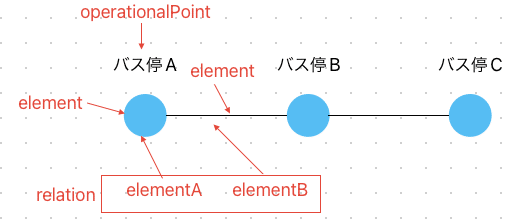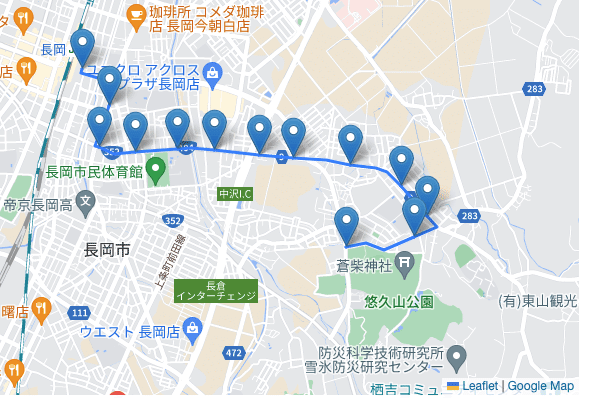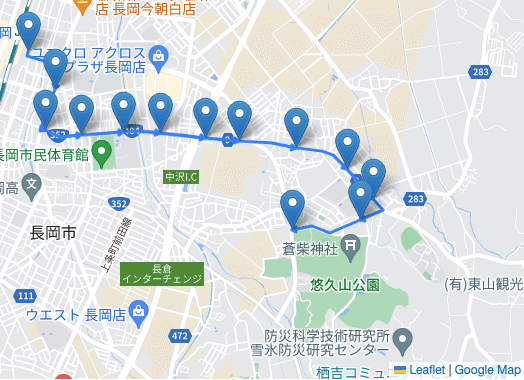goaでバスの路線図APIを作る(ビュー編)
ビュー実装
前回のAPIから取得できるデータを使ったビューを作る。
ビューは地図上に路線図を書くので、leafletを使う。
APIから取れるデータはこんな感じになっていて、

図にするとこんな感じ。

elementをrelationのA→Bの順に繋いでいくと路線経路が引ける様になっている。
このデータをLeaflet用のデータに変換するところを書いて
// Geojson型へキャスト
function getCoordinate(c){
return [c.latitude,c.longitude]
}
// 経路を生成
function getCoordinates(cs){
var coordinates = []
for(let c of cs){
coordinates.push(getCoordinate(c))
}
if(coordinates.length==1){
coordinates.push(coordinates[0])
}
return coordinates
}
// elementをleafletのFeatureへキャスト
function getFeature(element){
return {
"type": "Feature",
"geometry": {
"type": "LineString",
"coordinates": getCoordinates(element.coordinates)
}
}
}
// elementsをleafletのFeatureCollectionへキャスト
function GetFeatures(elements){
var features = []
for(let e of elements){
features.push(getFeature(e))
}
return {
"type": "FeatureCollection",
"features": features
}
}
// operationalPointの位置を取得
function GetBusstops(elements, ops){
var busstops = []
for(let op of ops){
for(let e of elements){
if(op.elementID == e.id){
coordinate = getCoordinate(e.coordinates[0])
busstops.push({
"coordinate": [coordinate[1],coordinate[0]],
"name": op.name
})
}
}
}
return busstops
}このデータをleafletに渡す。
// 線(FeatureCollection)オブジェクト生成
var line = GetFeatures(res.elements)
// 線を描画
L.geoJSON(line,{
onEachFeature: function onEachFeature(
feature,
layer
){
if(feature.properties && feature.properties.popupContent){
layer.bindPopup(feature.properties.popupContent);
}
}
}).addTo(map)
// バス停情報の配列生成
var busstops = GetBusstops(res.elements,res.operationalPoints)
// バス停の表示
var popup = L.popup();
for(let busstop of busstops){
L.marker(busstop.coordinate).addTo(map).on("click",function(e){
popup.setLatLng(e.latlng).setContent(busstop.name).openOn(map);
})
}ここまでで、地図上に線とバス停が描ける。

これに加えて、relationでelementを辿って経路を矢印で描く処理を作る。
// 矢印を引く
for(let r of res.relations){
var elementA=[], elementB=[]
var arrow = false
for(let e of res.elements){
// 矢印の起点
if(r.elementA == e.id){
if(e.coordinates.length>1){
elementA = getCoordinate(e.coordinates[e.coordinates.length-2])
}else if(e.coordinates.length==1){
elementA = getCoordinate(e.coordinates[0])
}else{
console.error("coordinate not found")
}
}
// 矢印の終点
if(r.elementB == e.id){
if(e.coordinates.length>1){
elementB = getCoordinate(e.coordinates[1])
}else if(e.coordinates.length==1){
elementB = getCoordinate(e.coordinates[0])
arrow = true
}else{
console.error("coordinate not found")
}
}
}
// polylineDecoratorへ矢印を引く座標を渡す
if(arrow) {
var polyline = L.polyline([[elementA[1],elementA[0]],[elementB[1],elementB[0]]]).addTo(map);
var decorator = L.polylineDecorator(polyline, {
patterns: [
{offset: '100%', repeat: 0, symbol: L.Symbol.arrowHead({pixelSize: 5, polygon: true, pathOptions: {stroke: true}})}
]
}).addTo(map);
}
}矢印を引くのは下記を使った。
経路を引いたのがこちら。

というわけで、goaでAPI作り終わりました。
感想
というわけで、goaでAPI作り終わりました。
goaはわからないことを調べるのが少し大変だけど、慣れればすごく良さそう。
何よりAPIとして動くモックがすぐにできて、designが変わってもある程度は自動生成の範囲でカバーできるので、開発効率上がりそうだなと。
以上、読んでくださりありがとうございました。
今回作ったコードは下記に置いておきます。
